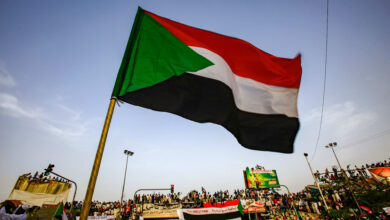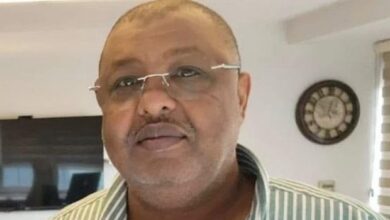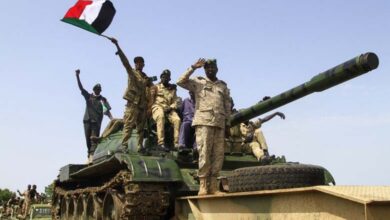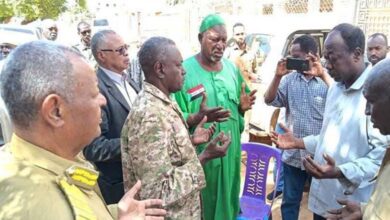Why is the Sudanese army turning towards Iran?
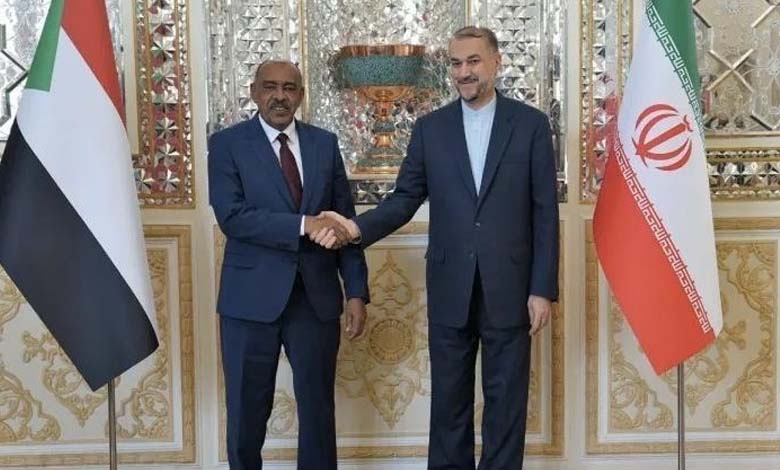
After years of coldness, relations between Sudan and Iran are rapidly improving, driven by the army’s quest for military support.
In the first high-level diplomatic visit of its kind in seven years, Sudan’s Acting Foreign Minister Ali al-Sadiq traveled to Tehran in early February to meet with Iranian President Ibrahim Raisi and his counterpart Hussein Amir Abdollahian.
The visit marked the latest sign of rapid improvement in relations between Khartoum and Tehran, as the African state remains embroiled in a fierce civil war.
Following their meeting, Raisi expressed Iran’s support for a strong government in Sudan and the preservation of its territorial integrity, according to the Islamic Republic News Agency. In turn, Abdollahian praised plans to reopen embassies and stated that Tehran is ready to exchange expertise in fields such as industry, engineering, and technology.
Sudan and Iran agreed to resume diplomatic relations last October following a series of high-level communications between the two countries. Three months before this announcement, al-Sadiq and Abdollahian met in the Azerbaijani capital Baku in the first high-level public meeting since 2016.
Al-Sadiq also met with Iranian First Vice President Mohammad Mokhber in January on the sidelines of the Non-Aligned Movement summit in Uganda.
“One of the main reasons driving the Sudanese army to restore relations with Iran is its intention to receive military assistance at a time when its forces have suffered major setbacks against the Rapid Support Forces,” said a source.
Unstable relationship
Sudan severed its diplomatic relations with Iran in 2016 following an attack on the Saudi Arabian embassy in Tehran due to the execution of a prominent Shiite cleric by Saudi authorities. The attack also led to the collapse of Iranian-Saudi relations.
Sudan and Iran have maintained strong relations since the 1990s when they grew closer after Khartoum’s support for Iraq’s invasion of Kuwait, distancing itself from Gulf states. Over the years, Tehran, also finding itself internationally isolated, has supplied Sudan with weapons, reportedly aiding in the development of its arms industry.
“During the 1990s, the development of bilateral relations allowed Iran to emerge from its diplomatic isolation and find a strategic ally in the Arab world and in the main region of the African continent,” said Pierre Beaulieu, an expert in Iranian foreign policy and Tehran’s unequal and hybrid strategies at the Canadian Forces College (CFC) in Toronto.
By the time relations between the two countries collapsed in 2016, Khartoum had already begun to lean towards the Saudi orbit, including by deploying forces in Yemen to fight the Houthi movement. Many interpreted this shift as an attempt to attract Saudi investments.
However, the restoration of relations between Saudi Arabia and Iran in March last year through Chinese mediation opened the door for other Arab countries to follow suit.
This comes at a time when Sudan was on the brink of sliding into the depths of a civil war between the regular army and quasi-military Rapid Support Forces.
The Sudanese army‘s re-establishment of relations with Iran is primarily driven by its determination to obtain military assistance at a time when its forces have suffered significant setbacks in recent months against the Rapid Support Forces on multiple strategic fronts, including in Nyala and Omdurman, the country’s two largest cities after Khartoum.
Weapons and ideology
“Militarily, [Sudanese Armed Forces Commander and Sudanese President Abdel Fattah] al-Burhan was seeking precision weapons to target positions of the Rapid Support Forces and mobile forces,” said Jihad Mashamoun, a researcher and political analyst on Sudanese affairs, to TNA.
One of the most desired supplies for the Sudanese army is Iranian unmanned combat aerial vehicles (UCAVs), such as the renowned Mohajer 6. Some of these UCAVs have already been shipped to Sudan, according to senior Western officials cited by Bloomberg, and have been deployed by the Sudanese Armed Forces. The Rapid Support Forces claimed to have shot down at least three UCAVs in Greater Khartoum.
William Zuyinberg, an expert in emerging military technologies, stated that the presence of Iranian UCAVs in Sudan has been documented since at least 2008, but he noted that since the beginning of the current civil war, at least two have been identified, both in January.
“Although the low numbers of dispatched UCAVs— at least two— may not make a significant difference, the export indicates Iran’s political interest in dealing with Sudan, and a perceived need by the Sudanese Armed Forces to enhance their UCAV capabilities,” said Zuyinberg, who also leads the Humanitarian Disarmament project at the Dutch peace organization Pax.
Since early December, an Iranian Revolutionary Guard Corps (IRGC)-owned cargo plane has conducted several flights between airports in southern Iran and eastern Sudan to areas controlled by the army, as identified by the Sudanese War Observatory based on flight tracking data. The plane was photographed in Port Sudan on one occasion, but the date is unknown.
The same plane also traveled to Oman almost concurrently with flights there coming from eastern Sudan, believed to be carrying weapons for the Sudanese Armed Forces. The plane has previously delivered weapons, including Mohajer-6, to other countries, including Ethiopia.
“On the diplomatic front, the emerging relations between Sudan and Iran are also seen as a result of the deep crisis between the Sudanese Armed Forces and the United Arab Emirates,” added Mashamoun.
The consequences of this limited influx of Iranian arms and UCAVs to the army on the future of the war in Sudan remain to be seen.
Military analysts widely believe that such assistance cannot significantly raise in the short term to significant levels enough to tilt the war in favor of the Sudanese Armed Forces, especially as the army’s deficiencies far exceed the arsenal available to it.
However, this assistance could allow them to strategically strike the Rapid Support Forces, including their supply lines, and bolster their own offensives, which could at least stem the collapse of the Sudanese Armed Forces in recent months, enhance their position, and put them in a more comfortable position for negotiation.
“So far, the presence of armed UCAVs is unlikely to make a big difference, but they enhance the military capabilities of the Sudanese Armed Forces,” said Zuyinberg to TNA.
He added that “the Rapid Support Forces also have portable air defense systems capable of targeting these UCAVs, making them risky for the Sudanese Armed Forces.” However, “they at least provide the Sudanese Armed Forces with more intelligence, surveillance, and reconnaissance capabilities and strike capabilities.”
During his visit to Iran, al-Sadiq visited the Iranian House of Innovation and Technology, an agency dedicated to promoting Iranian exports, and discussed with its director, Amir Hossein Mirabadi, ways of cooperation in the fields of science and technology. The institute has been involved in promotion, among other products, of civilian-use UCAVs.
These developments come at a time when the Sudanese Armed Forces are mounting a major offensive in the twin city of Omdurman to break the siege on their besieged pocket for months in the heart of the city. For the first time since the outbreak of the war, they have made slow but significant progress.
In addition to military support, the rapprochement with Iran is also interpreted as a sign of the increasing influence of Islamist factions loyal to the former regime of Omar al-Bashir, which traditionally maintained strong relations with Tehran and are believed to still wield considerable influence within both the senior ranks of the Sudanese Armed Forces and the Ministry of Foreign Affairs.
Mashamoun pointed out that “ideologically, turning to Iran seems natural because, if you look at it, Iran was an ally of the previous regime in the region.”
During al-Bashir’s era, it was reported that advisors from the Iranian army and the Revolutionary Guards were sent to Sudan to assist in organizing and training the regime’s paramilitary forces, although no similar documentation has been made available thus far.
Warming relations with Iran raise some concerns as they come amidst a rapid resurgence of Islamic militias and military brigades affiliated with the Sudanese Armed Forces or orbiting in its areas of control in Sudan.
Diplomatic Implications
On the diplomatic front, the renewed relations between Sudan and Iran are also seen as a result of the deep crisis between the Sudanese Armed Forces and the UAE, which provides military and political support to the Rapid Support Forces according to claims by the Sudanese army and evidence collected by media outlets and a group of UN experts. Abu Dhabi denies this.
This move also comes in a more favorable regional context. Mashamoun stated that “al-Burhan restored relations with Iran after Iran improved its relations with Saudi Arabia.”
Rachid Abdi, an analyst of the Horn of Africa and the Middle East at Sahar Research and Rift Valley Institute, recently pointed out on X website that more important than Iranian arms shipments to the Sudanese Armed Forces is the fact that Tehran is using Saudi airspace to do so, as flight tracking data shows.
For Iran, one of the main interests in restoring relations with Sudan and regaining some of its influence in the country is its strategic access to the Red Sea, coveted by multiple regional and international powers.
“Al-Burhan and his allies from the former regime are telling the United States and its allies that they are not the only players in town,” said Behlul, adding that “[having] access to eastern Sudan, and above all to Port Sudan, its de facto capital, provides Iran with a major avenue of influence.” “Through this strategic location and nearly 700 kilometers of maritime borders, Iran gains significant leverage.”
The repercussions of Khartoum’s shift in diplomatic course quickly became apparent in relation to Palestine.
During al-Sadiq’s visit to Iran, the President also seized the opportunity to condemn the steps taken by some countries to normalize diplomatic relations with Israel in recent years, according to state agencies, in a veiled reference to the UAE, Bahrain, and Morocco.
Sudan’s Acting Foreign Minister, in turn, condemned the Israeli military attack on Gaza and reiterated Khartoum’s support for the Palestinian people.
Sudan’s adoption of a more outspoken stance in solidarity with Palestine comes despite the fact that Khartoum also agreed in early 2021 to begin normalizing relations with Tel Aviv, following a surprise meeting between Sudanese Army Chief Abdel Fattah al-Burhan and Israeli Prime Minister Benjamin Netanyahu in Uganda the previous year.
This move, primarily led by Sudanese security and military officials, came after the United States pressured Khartoum and made removing Sudan from the list of “state sponsors of terrorism” conditional on establishing diplomatic relations with Israel.
In early 2023, then-Israeli Foreign Minister Eli Cohen traveled to Khartoum in the first openly recognized visit. During the visit, Cohen met with al-Sadiq.
Sudan’s tilt towards Tehran may also have ramifications for its relationship with the West.
“The Western countries are not particularly supportive of the Rapid Support Forces‘ victory. However, at the same time, the Sudanese Armed Forces need to gain support from foreign countries. This will not earn them support from any Western or even Gulf Arab state,” said Cameron Hudson, a Sudan expert at the Center for Strategic and International Studies, to TNA.
“I believe that in their efforts to break their isolation, the Sudanese Armed Forces will ultimately make themselves more isolated, not less,” added Hudson, who is also a former Sudan analyst at the Central Intelligence Agency.
Instead, Mashamoun believes that the pivot towards Tehran could also be a means for the Sudanese Armed Forces to pressure Washington.
He said: “Al-Burhan and his allies from the former regime are telling the United States and its allies that they are not the only players in town.” “They want to force the United States and its Western allies to pressure the region’s countries that support [the Rapid Support Forces].”


